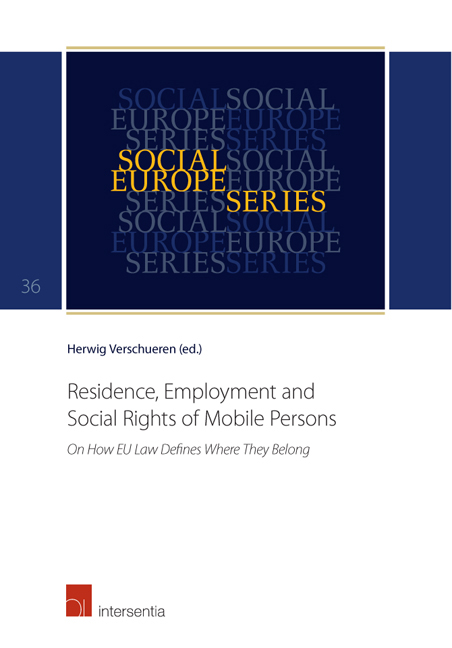Book contents
- Frontmatter
- Preface
- Contents
- List of Abbreviations
- List of Contributors
- Chapter 1 How EU Law Defines where Mobile Persons Belong. An Introduction
- Chapter 2 Family as Link. Explaining the Judicial Change of Direction on Residence Rights of Family Members from Third States
- Chapter 3 The Direction of the Court's Family Reunification Case-Law. A Plea for (Timely) Moderation
- Chapter 4 Sufficient Resources and Residence Rights under Directive 2004/38
- Chapter 5 Free Movement of Persons and European Solidarity. A Melancholic Eulogy
- Chapter 6 Once a Foreigner, Always a Foreigner. Who Does Not Belong Here Anymore? Expulsion Measures
- Chapter 7 Who Does Not Belong Here Anymore? A Statistical Snapshot of Member States’ Practices
- Chapter 8 Civic Integration Exams in EU Immigration Law. What Integration is Not in European Law
- Chapter 9 I Study Here, and Thus I Belong? Mobile Students in the European Union
- Chapter 10 Being Economically Active: How It Still Matters
- Chapter 11 Where Do EU Mobile Workers Belong, According to Rome I and the (E)PWD?
- Chapter 12 Conflicting Rules of Conflict: Social Security and Labour Law
- Chapter 13 Conflicting Rules of Conflict: Social Security and Labour Law. A Response
- Chapter 14 Where Does the UK Belong?
Chapter 10 - Being Economically Active: How It Still Matters
Published online by Cambridge University Press: 22 September 2018
- Frontmatter
- Preface
- Contents
- List of Abbreviations
- List of Contributors
- Chapter 1 How EU Law Defines where Mobile Persons Belong. An Introduction
- Chapter 2 Family as Link. Explaining the Judicial Change of Direction on Residence Rights of Family Members from Third States
- Chapter 3 The Direction of the Court's Family Reunification Case-Law. A Plea for (Timely) Moderation
- Chapter 4 Sufficient Resources and Residence Rights under Directive 2004/38
- Chapter 5 Free Movement of Persons and European Solidarity. A Melancholic Eulogy
- Chapter 6 Once a Foreigner, Always a Foreigner. Who Does Not Belong Here Anymore? Expulsion Measures
- Chapter 7 Who Does Not Belong Here Anymore? A Statistical Snapshot of Member States’ Practices
- Chapter 8 Civic Integration Exams in EU Immigration Law. What Integration is Not in European Law
- Chapter 9 I Study Here, and Thus I Belong? Mobile Students in the European Union
- Chapter 10 Being Economically Active: How It Still Matters
- Chapter 11 Where Do EU Mobile Workers Belong, According to Rome I and the (E)PWD?
- Chapter 12 Conflicting Rules of Conflict: Social Security and Labour Law
- Chapter 13 Conflicting Rules of Conflict: Social Security and Labour Law. A Response
- Chapter 14 Where Does the UK Belong?
Summary
INTRODUCTION
The classic way for migrating Union citizens to claim rights in the host State is to be economically active. Ever since the Rome Treaty of 1957, economic migration between the Member States is one of the cornerstones of the process of economic integration through the internal market. The original Article 48 EEC (now Article 45 TFEU) secured the freedom of movement for workers, which entails the right to move freely within the territory of the Member States for the purpose of employment, the right to stay and remain in the host Member State as well as the prohibition of any discrimination on grounds of nationality between the workers of the Member States in terms of employment, pay and working conditions. Article 52 (now 49 TFEU) guaranteed unrestricted freedom of establishment for self-employed persons in the Member States and equal treatment with nationals of the host State and Article 59 (now 56 TFEU) prohibited restriction to the freedom to provide services across the border.
After more than fift y years of European integration economic activity still is the central connecting factor between migrating EU citizens and the legal order of host Member States. This chapter proceeds as follows. It first recapitulates the rights economically active EU migrants have under EU law (section 2). Next it examines three questions. In section 3 it questions if and why it is still important for a person to be qualified as economically active or to be considered as a family member of such a person. Relevant questions indeed, because since the introduction of European citizenship the application of the general prohibition of discrimination on grounds of nationality, is now also triggered in situations where the migrant person is economically inactive (Articles 18, 20 and 21 TFEU). In section 4 the question which persons can rely on the status of ‘worker’ will be examined. Are all ‘working’ activities sufficient to qualify a person as a worker and what are the problems of applying the definition of worker in secondary law and in the CJ's case-law?
- Type
- Chapter
- Information
- Residence, Employment and Social Rights of Mobile PersonsOn How EU Law Defines Where They Belong, pp. 187 - 214Publisher: IntersentiaPrint publication year: 2016



